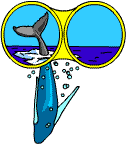A Whale of a Tale
Created | Updated Mar 26, 2002

What's the difference between a whale and a fish?
The answer, as any school child knows, is that a crumbed whale fillet would clearly be out of proportion to a scoop of chips (fries) and there's not a sheet of paper in the world big enough to wrap it.
Whales are also mammals, but that's by the by. It's far from by the by with ecologists and Greenpeace. Whales breathe air just like us, we are told, it's just that their air intakes are on the top of their heads and ours are at the front. They are also intelligent, we are told. Yep, intelligent enough to be the only occupants of the huge ocean to get lost in it and swim ashore in large numbers to die.
Apart from that substantial glitch in an otherwise well-formed system they are indeed creatures of intelligence, and they possess emotions and feel pain. A harpoon in the side would indeed feel similar to what a human would feel if they had a dagger plunged into them. They would know full well they were mortally injured if struck. Some of their species are threatened with extinction, we are also told, and after the butchery of the 19th century, when whaling was a major international industry, I'm not surprised. They were taken in their thousands and it went on for years and years... until stocks effectively ran out.
But whaling, when you think about it, was no different to fishing. It's just that they couldn't build nets big enough to catch a pod of whales so they harpooned them instead. Whales provided oil, which in turn provided the base for everything from soap and cosmetics to margarine and lamp fuel. Their meat was also consumed. No one knew how many whales there were, back then, when the hunting provided employment and cash flows for fledgling colonies. As long as whales came ponderously swimming up the coast year after year the ships would put to sea to catch them.
Today, we still drag thousands of tonnes of fish from the sea, but in a more restrained manner (except for the exploitative, greedy sods who relentlessly pillage schools of Antarctic toothfish). We also slaughter sheep, cattle and chickens - but again, in a sustainable manner. We don't catch whales any more because their numbers were decimated. Besides, technology intervened to provide alternatives to whale oil in the manufacture of products. And we could do without the meat. Those with a penchant for a steak from the sea could satisfy themselves with a kingfish, hapuka or tuna steak.
I said 'we' don't catch whales any more, but a couple of renegade nations still do. These days it's called research. Check this out:
'Research activity pursuant to international whaling convention'
that's what the sign attached to the stern of a Japanese butchery ship sailing the southern oceans declares. You see, they have to catch and kill whales to check out breeding patterns, ages and other research stuff. And after they've researched and researched, they process the accidental by-product (the meat) and take it back to Japan where it's sold, for a pretty penny, too, I might add. The whale they are hunting is minke, which is not as endangered as its mammal mates, but moves closer up that path every time more 'research' is done.
Tagging and using satellite technology, and other internationally recognised research means, is clearly not up to scratch, the researchers from the land of the rising harpoon are telling us. They have to slaughter a few hundred minke whales (and process them with astonishing skill aboard) to assure themselves that yes, there are still some minke whales left. But they'll have to go and get some more next year just to be on the safe side.
I find the whole deal bizarre and callous. In these confusing days, I await the arrival of armed thugs walking into shops with jackets emblazoned with the words
'Armed robbery as part of research into violent crime'.
I may well stroll into the local hostelry tonight with a sign attached to my head declaring:
'Research into drinking habits... three pints on the house, please'.
Now don't think I'm going all green and soft but I applaud Greenpeace for engaging in a little deep ocean hunting of its own, namely 'research' ships. No intelligent family-orientated creature, which has no place in the human food chain, should be slaughtered. Long may the Greenpeace hoses blind the eyes of the harpoon aimers.
Finally, and because I haven't finished a yarn with a ludicrous remark for some time, here it comes: while the America's Cup fleet is on the water waving the sails, Greenpeace is on the water... You know the rest.
